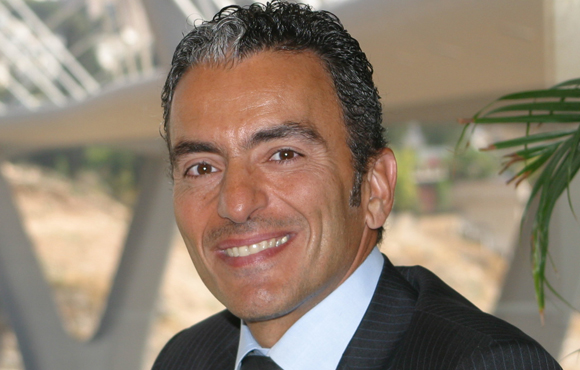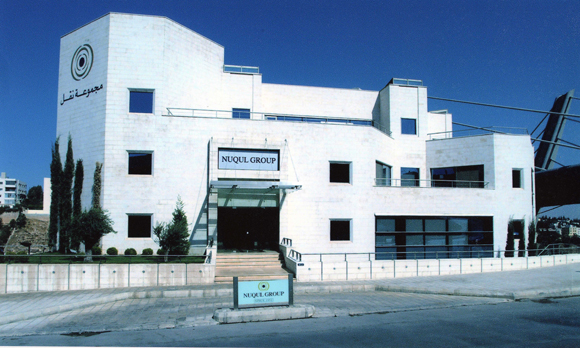Family Business in Jordan
We have identified the areas we want to enter by looking at 4,000 different industries and business activities.
Interview with Ghassan Nuqul, Vice Chairman of Nuqul Group

What is your perception of the business climate in Jordan and what is the outlook as the leading company in Jordan?
There was no country that was not affected by the crisis, but Jordan was affected less than other countries due to many reasons, most importantly the Central Bank and government’s conservative policies, which have played a positive role in our ability to face the challenges.
The world has witnessed slow growth, and Jordan is now witnessing some growth. We expect it to be 4% despite the instability in the world. I am cautiously optimistic. Some sectors have done beautifully well, such as tourism and food industries.
These items will drive the growth in the economy. Real estate development and some other mega projects have been delayed, but consumers will continue to consume. Services will continue to do well in general, be it education, health or other related sectors. The private sector and the government have a lot of challenges, and we need to work together to be able to forge strongly and prepare for 2011. We need to think of mega projects where the private sector can take lead.
What remains the major challenge for Jordan; the over employment in the public sector or the energy dependency on foreign sources?
All of the above along with energy issues, prices, water, transportation, infrastructure. Jordan has managed to make use of political and economic crises, so I am always optimistic in our resilience. The productivity of Jordanian laborers is also an issue. Thirdly is the budget deficit and government debt. People think it’s only the government’s problem but it affects the economy, the private sector, and foreign direct investment. We can address these issues; we might have to take drastic measures and tough decisions to overcome them, but where there is a will there is a way. Government expenditure is also an issue, but capital projects can always come in the form of public-private partnerships.
Nuqul is characterized by industrial diversification, vertical integration, regional expansion, and synergy. Could you chart the growth of the group and give us some key figures ?
In 1985 the group had four companies. Today it has 31 companies and is growing in sales, profits, and exports. The group has gone through the crisis with flat sales, we scored the best record of profits in 2009 because our group’s systems, procedures and projects set in place were in the right position at the right time to make use of the opportunities that came along with the crisis. It was an opportunity for us to be aggressive in marketing, and in setting up new plans, build new machines, and so on. One of our CEO’s mentioned that he wouldn’t have wanted to live his life without going through a financial crisis. Our team has risen to the occasion; we controlled all of our expenses, reduced our waste, improved our productivity, and increased our market share. The crisis has served us well. We are a disciplined company and that was very important.
How would you describe the group’s strategy over the next four years and wouldn’t over-diversification be a cause of concern to you?
The group has two major holdings ; one is our core and it is the paper mills and paper converting industries every time we go to a country we have a very specific strategy for it ; we know which markets we have to be in with clear timeframes. The core will continue to move aggressively, we have to continue to be the leader.
As we speak we are setting up a new plant in Morocco, we have new expansion in Egypt, and many other projects. We are investing in new technologies and systems. Every time we expand we have risk mitigation policies in place to face the challenges that come with being in difficult and sometimes unstable markets. Our model is changing and we are aggressively investing in new areas. We are active investors, and have criteria for these investments.
We have identified the areas we want to enter, by looking at 4,000 different industries and business activities. From those, our investment team identified the sectors that give good long-term returns, with solid fundamentals. With that we identified six major sectors, and then we proactively started looking at investments. Parallel to that, as a group we are active and we get to participate in different projects, we evaluate if they meet the criteria of the sectors we’re interested in. We work slowly but surely, and once we see a good opportunity we capitalize on it. We are long-term oriented, and open.

What is your vision for the company?
The core business is very clear to us : to continue to be the leader in capacity, quality, innovation and market share and to maintain our competitive edge by continuously raising the bar We know exactly where we want to be in 2018 and onwards.
On the non-core level and specifically the wide range of investments we are currently in and plan to enter, we are looking for success, not just profits. We want to learn and to become involved in different sectors. We are conservative investors although we do take risks sometimes, if they are calculated risks. We want to enter new areas like waste management, recycling, to get into multi-national companies, and maybe go into Europe.
What is the social dimension of the company? How do you help those around you?
We are direct employers of 5,800, people. The human capital is our most important asset, we focus on attracting the best caliber, while nurturing our people. We are committed to our people from within and to our communities and stakeholders as well in all of the operating markets we are present in.
Our corporate social responsibility evolved over the years and the commitment has always been there since 1952. On a corporate level the Group is currently adopting a district in the north of Jordan- which is part of the poverty pockets, and we are aiming for an impactful, sustainable, long term result that will empower residents with the right tools for a better living.
We started our work by conducting a professional need-assessment study through partnership with a leading NGO, since then we started to address community needs by partnering with key NGOs and working in the field of : feeding, soft skills training, youth empowerment and mentoring, establishing a micro venture fund to encourage income generating projects among others like setting up a library and a playground. Once this model matures we will take it to another community.
Two years ago we started the Family Foundation to institutionalize the philanthropic activity of the family. We want each member of the Foundation to give back to his community, not to us. On each company level we are also involved in corporate social responsibility and each brand has its own direction in line with its own strategy.
What are your major challenges?
The Family Foundation, social responsibility and doing good in everything you do in your business makes you sleep at night. Every business has risks, but we have a department to deal with risk mitigation so as not to worry. The group has had its share of mishaps; we were hit by the Israelis in Lebanon, we had fires, we had many problems, but if you are in business you have to be ready for them. Problems should always be viewed as opportunity that needs to be taken advantage of. If we are not able to keep up with technological advancements, it could be a problem ; a catastrophe in the prices of raw materials, or lack of materials, new competition, political instability are all things that could affect us.
How do you communicate yourself internationally?
In the core business we are very well-known. We are active in symposiums, conferences, are in close contact with the raw material and machine suppliers, and we have changed our model to forge partnerships with all our suppliers rather than just buying and selling. We have broken the World Record for the largest tissue box in the world! We always strive to be innovative. We are very well-connected with everyone, we have an outsourced communications company and we work closely to reflect the messages we want to all of our target audiences.
We seek to engage with our stakeholders and have recently networked with banks from Jordan and presented our progress by commending our partnership with them. We are also involved in regional NGO’s and major activities such as the World Economic Forum. The group has published a sustainability report and is concerned about environmental issues.
A corporate citizen works comprehensively to give back to the community and contribute socially, environmentally and economically and that is what drives our business. We do it because we believe in the cause and we are passionate about it, I want to always be careful of not overstepping the line where it becomes too obvious that you’re trying to sell yourself.
Tell us about the reforms you brought to the family business.
I am very grateful that my father, who founded this business, is very receptive to all the new ideas. It wasn’t easy because I wanted to institutionalize the family business. To do that you need to have a governance model in place, which is not always easy for a family business because it limits what you can do.
We did a family protocol and we all signed on it; it was difficult because people get emotional, but everyone knew their rights and responsibilities. You need to compensate your people very well, and give them authority to make decisions and make mistakes. My word to family businesses is to institutionalize, use good governance, make family protocol, and face the hard decisions now while there is still a patriarch in place.
Do you have message for the international community about Jordan?
I am being objective in saying that I cannot put into words what Jordan has done for our group, especially as a family business, and many other businesses. It is a very small population in a difficult neighborhood, but look at its image : it is stable in the middle of turmoil, we have done superbly well given all the challenges, many local companies are exporting equipment and materials to the whole world despite energy and water scarcity, and transportation problems.
The environment is so supporting, making it a true hub in the region with a strong foundation that includes infrastructure, security, stability, moderation, leadership with a vision, and the involvement of the private sector. Jordan will continue to do well, will present itself over and over as a regional hub, we have a qualified human pool, services, telecommunication system, the environment and quality of life is nice. We have a very open-minded government with a democratic mindset like ours and I hope we move forward even faster.